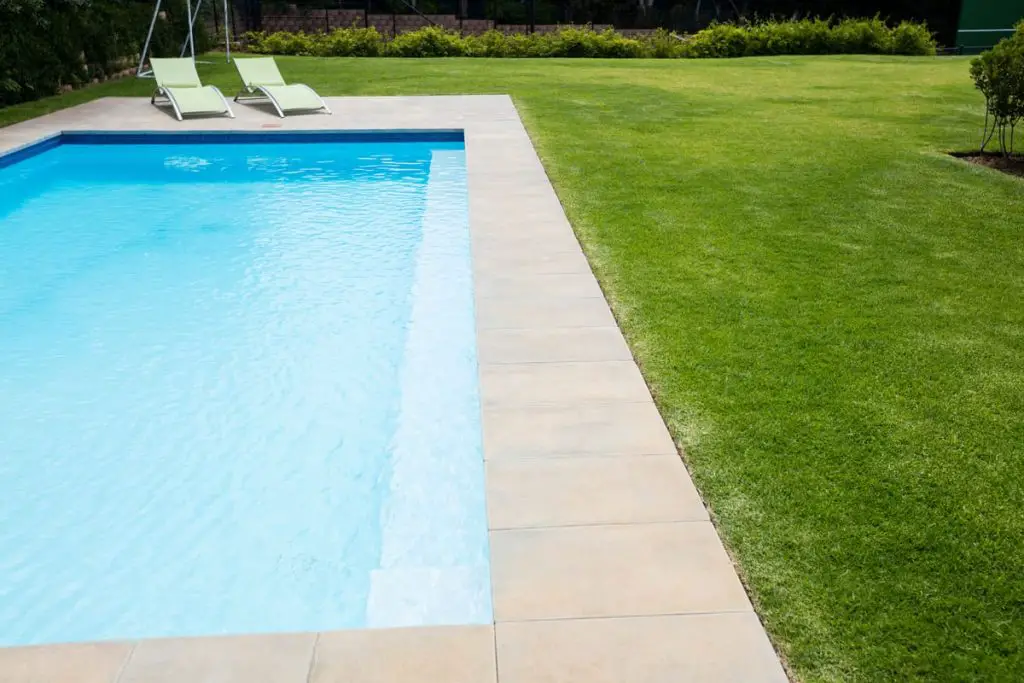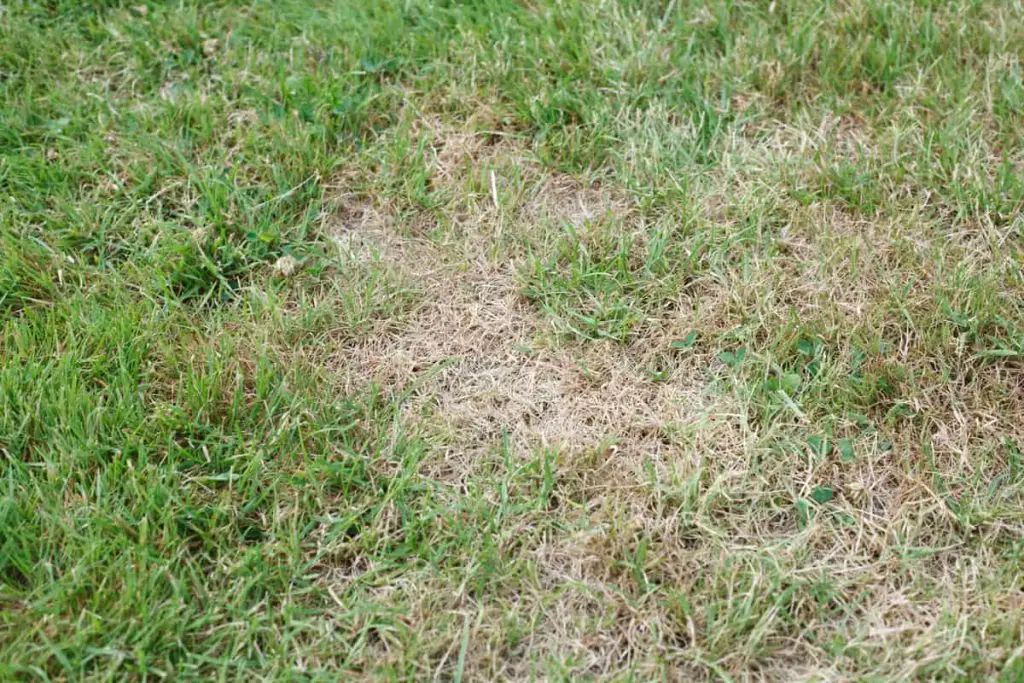Having a swimming pool has countless benefits, but it does require regular maintenance. Knowing that pool water contains a series of added chemicals, it’s fair to wonder if pool water will hurt your grass.
Swimming pool water can kill grass, but only if you regularly drain your pool water onto it. Occasional splashes with pool water have a negligible impact on grass. However, if you consistently wet your lawn with chemical-rich pool water, the grass may grow slowly and have a washed-out appearance.
There are numerous factors that can determine the level of impact your pool water may have. You should be aware of them, and know what to be mindful of when it comes to your lawn and pool water.

Things To Know About Swimming Pool Water and Grass
As a proud homeowner, you want your swimming pool and lawn to look their best at all times. The best way to keep your swimming pool looking beautiful is to use a pool chemical, such as chlorine or bromine.
If your lawn surrounds your swimming pool, here are six things to remember about pool water and grass:
Occasional Splashes Have Negligible Impact
Most swimming pool owners don’t drain their pool water onto the lawn, but they may still worry about the occasional splash harming the grass.
The good news is that random splashes on grass have little impact. There is an incredibly low concentration of pool chemicals in a splash of pool water. Besides, unless the same patch of grass is getting splashed multiple times a day, it’s unlikely to harm or kill it.
Chlorine Can Damage Grass
According to a 2014 Iowa State University study, irrigating grass with chlorine-rich water can cause micronutrient toxicity if the chlorine concentration is high enough.
Recycled municipal water typically contains more chlorine than swimming pool water. Your pool water would only damage your grass if you accidentally used too much chlorine or recently “shocked” your pool to remove excess algae.
Algaecide May Stunt Grass Growth
Pool algaecide is essential if you want your pool water to remain crystal clear with no algae.
Unfortunately, algaecide’s main ingredient is copper, which can stunt your lawn’s growth and cause it to have a dull appearance. However, this will only happen if you regularly use algaecide and the same patch of lawn is consistently splashed with pool water.
Occasional algaecide-rich splashes should not impact your lawn. Still, if you have recently added algaecide to your pool, avoid draining it onto your lawn.
Salt Can Harm Grass
Saltwater pools are popular, natural alternatives to swimming pools requiring chemicals.
Although saltwater from your swimming pool has less salt than seawater, it can harm your grass if you drain the pool’s water onto your lawn.
After saltwater drains into the soil, it will eventually evaporate. But the salt will remain in the soil. Grass needs tiny amounts of salt to regulate its vital processes. Nevertheless, too much salt will quickly dehydrate it, causing it to grow slowly or kill it.
Bromine Can Kill Grass in Extreme Cases
If you use bromine to keep your swimming pool sparkling clean, you may want to avoid draining your pool water onto your lawn.
A splash of pool water on your lawn now and then will not harm or kill the grass as the bromine concentration is too low to have much of an impact. That said, if you regularly drain your swimming pool water on your lawn, the bromine will accumulate in the lawn’s root system and tissues and eventually kill it.

Draining Pool Water Into Your Lawn
As a pool owner, you will inevitably find yourself in situations where you have to drain some water out of your pool. This can happen for various reasons, such as overflowing after a heavy rain.
Another common reason is when the pool chemicals become heavily imbalanced to where chemical treatment isn’t reasonable.
If either of these things happen, you may be forced to drain some water. As such, there are steps that you should take both before and after draining.
Reduce Chlorine or Salt Before Draining Your Pool Water
Most folks don’t drain their swimming pools often. When you do, the best method is to get rid of it via your home’s sewer cleanout system.
Some cities allow their residents to drain swimming pool water into the street, but it’s best to check with your local authorities beforehand.
If you want to drain your swimming pool water onto your lawn, you may consider reducing the chemical or salt level a few days beforehand. This will mitigate the damage to your lawn.
To reduce chlorine or bromine levels in your pool, you can use one of the following methods:
- Stop adding chlorine and allow the level to decrease through aeration and sunlight.
- Add ascorbic acid (vitamin C) or hydrogen peroxide to reduce the chlorine level gradually.
- Use sodium thiosulfate for a rapid chlorine level reduction.
To decrease the algaecide level in your swimming pool, stop using it, and wait two or three days for it to dissipate.
Water Your Grass Thoroughly After Draining Into It
After draining the swimming pool’s water onto the grass, water your grass thoroughly to remove any remaining salt or chlorine.
For saltwater pools, it’s impossible to remove the salt content as salt doesn’t evaporate. Direct the pool water into your home’s sewer cleanout line if you want to drain the pool.
Can Straight Swimming Pool Chemicals Kill Grass?
I’ve explained that swimming pool water has little impact on grass, if only occasional, random splashes occur. But what happens if you accidentally spill pool chemicals on your lawn?
Swimming pool chemicals can kill grass if spilled onto your lawn undiluted. Luckily, they will only kill the affected patch. You can fix the situation by quickly removing the spilled chemical and watering your lawn thoroughly to dilute any remaining traces.
If you have accidentally spilled a dry swimming pool chemical onto your grass, remove the visible granules as quickly as possible, and then water the lawn. If you use liquid swimming pool chemicals, try and scoop up as much as possible and follow up with extensive watering.
For more information on pool chemicals, check out The Beginner’s Guide to Pool Water Chemistry.
Conclusion
So, does pool water kill grass? Well, it shouldn’t unless you drain all your pool’s water onto it. Random pool water splashes on grass are not harmful.
In large quantities, chlorine can cause micronutrient toxicity, while bromine can accumulate in the grass’s root system and kill it. Algaecide contains copper, and large concentrations can stunt the grass’s growth and give it a dull appearance.
Too much saltwater is harmful to grass. The water evaporates, but the salt remains in the soil and can dehydrate the grass’s root system and eventually kill it. Like chlorinated water, occasional splashes or saltwater are fine.
Sources
- Cobbitty Lawn Turf: Will Pool Water Kill Your Lawn?
- Solda Pools: Can Swimming Pool Water Damage Your Grass?
- Iowa State University Extension and Outreach: Chlorine Toxicity
- Environmental Protection Agency: Basic Information about Water Reuse
- Poolonomics: Bromine Vs. Chlorine: What’s The Difference?
- WebMD: Vitamin C (Ascorbic Acid): Overview, Uses, Side Effects, And More
- WebMD: Hydrogen Peroxide: Uses, Side Effects, and More
- National Center for Biotechnology Information: Sodium thiosulfate
